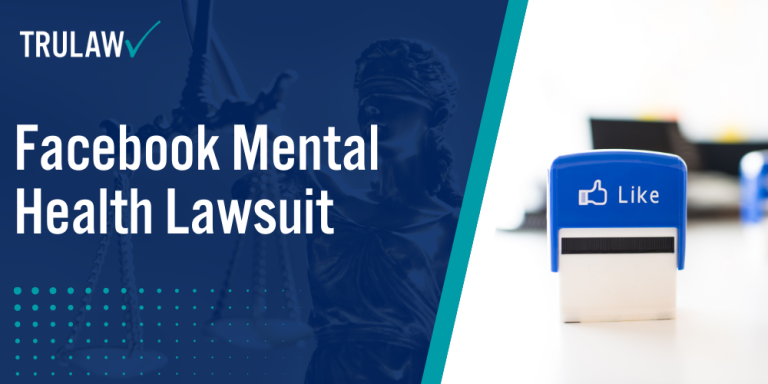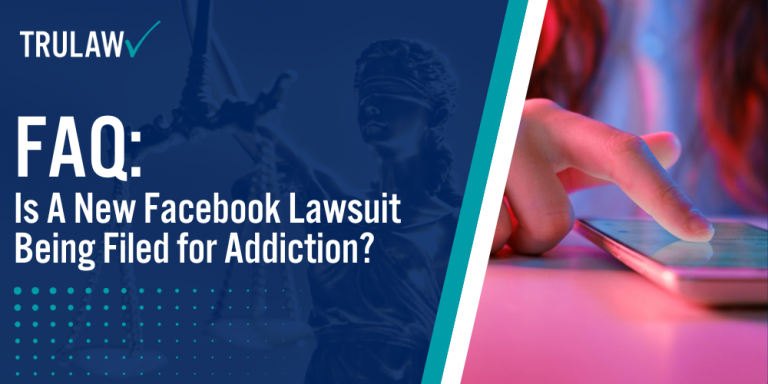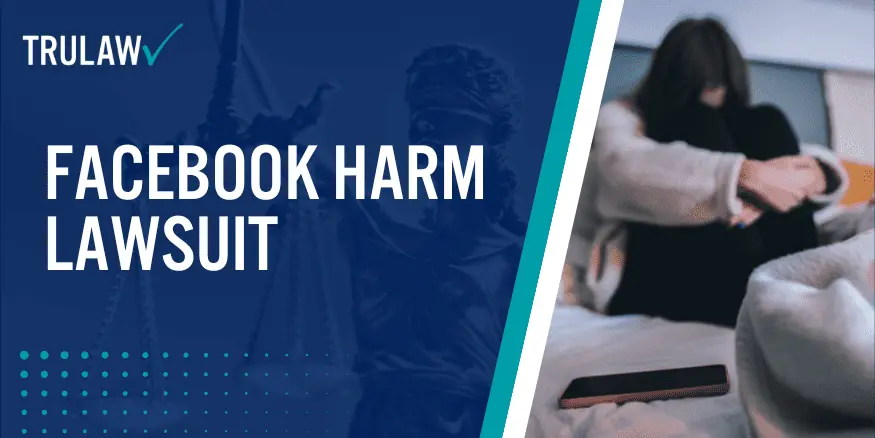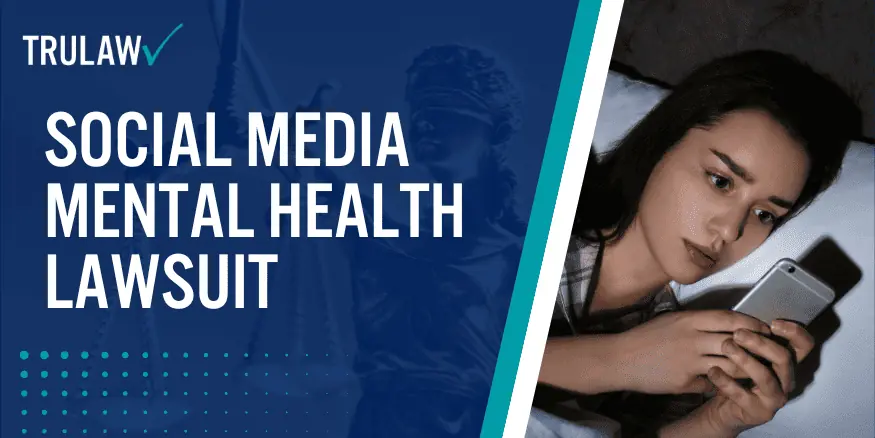Facebook Mental Health Lawsuit
- Last Updated: October 17th, 2024

Attorney Jessie Paluch, founder of TruLaw, has over 25 years of experience as a personal injury and mass tort attorney, and previously worked as an international tax attorney at Deloitte. Jessie collaborates with attorneys nationwide — enabling her to share reliable, up-to-date legal information with our readers.
Legally Reviewed
This article has been written and reviewed for legal accuracy and clarity by the team of writers and legal experts at TruLaw and is as accurate as possible. This content should not be taken as legal advice from an attorney. If you would like to learn more about our owner and experienced injury lawyer, Jessie Paluch, you can do so here.
Fact-Checked
TruLaw does everything possible to make sure the information in this article is up to date and accurate. If you need specific legal advice about your case, contact us by using the chat on the bottom of this page. This article should not be taken as advice from an attorney.
Key takeaways:
- Meta, once known as Facebook, is being sued by 41 states for creating features on its platforms that allegedly harm the mental health of young users. The lawsuit accuses Meta of designing addictive algorithms that contribute to anxiety, depression, and body image issues among teens.
- Users claim that despite internal research showing potential harms, Facebook prioritized profits over user safety. As a result, parents and consumer rights groups are pushing for accountability and demanding protections against content harmful to youth's mental wellbeing.
- To file a lawsuit against Facebook for mental health concerns, individuals should gather evidence like screenshots or medical records showing how social media use has harmed their mental health. They should consult with attorneys specializing in similar cases who can guide them on joining class-action lawsuits or filing individual claims.
Overview of the Facebook Mental Health Lawsuit
On this page, we will provide an overview of the Facebook mental health lawsuit, legal grounds of the Facebook mental health lawsuit, strategies for protecting young Facebook users, and much more.

Intro to the Facebook Mental Health Lawsuit
Key allegations in the lawsuits against Facebook highlight several critical issues, including:
- Algorithms geared to keep users engaged longer
- Features that promote excessive use, particularly among youths
- Creation of content likely to lead to addictive behavior
- Inadequate measures to protect user well-being
If you or someone you love has struggled with mental health challenges related to Facebook, you may qualify to file a claim.
Contact TruLaw using the chat on this page to find out if you qualify to seek compensation in the Facebook Mental Health Lawsuit today.
Table of Contents
Facebook's Impact on Mental Health
The lawsuits brought against Facebook have cast a spotlight on the complex relationship between social media and mental health, particularly among young users.
This section examines the evidence and concerns raised regarding the platform’s influence on psychological well-being.
Research Findings on Social Media and Mental Health
Various studies have detailed the association between social media usage and mental health.
Key findings from the research have identified several trends:
- Extended use of social media is often linked with heightened levels of anxiety and depression.
- Users may experience lower self-esteem, particularly when comparing their lives to those of peers on social media.
- A notable correlation exists between social media and the development of body image issues.
- The pressure to maintain a certain persona online can lead to emotional distress.
Social Media and Youth Mental Health Crisis
As the digital age intensifies, so do concerns over social media’s influence on the younger generation, particularly regarding its impact on their mental health and development.
Concerns about the effects of social media on children’s mental health are growing, with particular focus on:
- The increased risk of cyberbullying and its subsequent impact on a child’s well-being.
- Social media acts as a conduit for peer pressure, intensifying stress and anxiety.
- The impact of social media on sleep patterns, as excessive use, especially before bed, can disrupt sleep.
- Difficulty in separating social media from reality can affect young users’ perception of self and others.
Evidence from the Facebook Whistleblower
The revelations brought forth by a former Facebook employee have shed light on alarming aspects of the platform’s operations, underscoring a troubling disregard for user welfare.
The testimony of a Facebook whistleblower has provided unsettling insights into the platform’s practices:
- Internal documents indicate Facebook’s awareness of the negative mental health effects, particularly on teenagers.
- Evidence suggests that the platform prioritized growth over users’ well-being, especially concerning children and teens.
- An acknowledgment of algorithms that intensified exposure to harmful content related to eating disorders and depression.
- Reports of inadequate measures to address known issues contribute to the spread of toxic content affecting users’ mental health.
Legal Grounds of the Facebook Mental Health Lawsuit
The Facebook Mental Health Lawsuit is a pivotal legal case that highlights the intersection of technology and mental health, accusing Facebook of violating consumer protection laws and creating a public health hazard.
Consumer Protection Laws Invoked
The legal challenge to Facebook hinges on consumer protection laws, which are designed to safeguard individuals against unethical practices and products that could harm the public.
Legal action has been taken under these laws for several reasons:
- Failure to Warn: Plaintiffs claim that Facebook did not provide adequate warning about the potential risks to teen mental health caused by their social media platforms.
- Design Defect: The platforms are alleged to have been engineered to be addictive, magnifying the risk of poor mental health among users.
- Deceptive Practices: The company is accused of misrepresenting the safety of its platforms and the impact on users’ well-being.
- Negligence: Facebook may have neglected the duty of care to its users, particularly vulnerable populations such as minors.
California Superior Court’s Role
The California Superior Court is at the forefront of this landmark legal case against Facebook, tasked with crucial judicial responsibilities that could shape the outcome.
The California Superior Court serves as the battleground for this high-profile lawsuit, with the following critical functions undertaken:
- Assessing the Complaint: The court is responsible for evaluating the legal basis of the claim that Facebook’s actions or inactions violated consumer protection laws.
- Determining the Merit: It must determine whether sufficient evidence exists to support the allegations of negligence and harm.
- Overseeing Discovery: This phase allows both parties to gather evidence to bolster their case, an essential step in this complex legal challenge.
- Hearing Motions: Before proceeding to trial, the court will address motions which may include efforts to dismiss the case or requests for summary judgment.
- Conducting the Trial: If the case proceeds past preliminary hearings and motions, the federal court will oversee the presentation of arguments, witness testimony, and evidence from both parties.
- Issuing a Verdict: If the case comes to trial, the court will deliver a verdict on whether Facebook violated consumer protection statutes and is responsible for the alleged damages.
The Role of Tech Companies in the Facebook Mental Health Lawsuit
The Facebook mental health lawsuit casts a spotlight on the responsibilities and practices of tech companies, particularly regarding their influence on the mental health of younger users.
Responsibilities of Social Media Platforms
Social media platforms hold a significant degree of responsibility for how their products impact users.
Here’s a rundown of what is expected from these platforms:
- Protect young people by creating safe online environments.
- Develop and enforce policies to prevent harm.
- Offer transparent reporting mechanisms for users.
- Provide resources and support for mental health concerns.
- Ensure that user experience does not prioritize corporate profits over well-being.
- Actively work to understand the impact of their services on youth mental health.
Allegations of Negligence by Meta
Meta Platforms Inc., Facebook’s parent company, has been accused of handling user safety and mental health issues.
Specific points of concern include:
- The company’s internal research indicating potential harm to young users was allegedly downplayed.
- Features that could attract and addict children are at the center of the lawsuit for not being addressed adequately.
- A failure to implement changes that would lessen the potential for harm has led to calls to make companies accountable.
- The settlement proposals indicate a recognition of the need for corporate responsibility in the tech industry.
Plaintiff Testimonies and Case Studies: Facebook Mental Health Lawsuit
In examining the Facebook Mental Health Lawsuit, it becomes apparent that families and school districts are vocal about the purported negative impacts of social media on youth mental health.
Stories from Affected Families
Affected families have raised concerns about the significant mental health issues stemming from the use of Facebook by teenagers.
These issues include, but are not limited to, addiction, depression, and anxiety.
Some representative testimonies include:
- A 14-year-old became increasingly isolated and exhibited signs of social media addiction.
- The family of a 16-year-old girl noted her struggle with body image intensified after using Facebook and Instagram, leading to an eating disorder.
- Parents observed that their 15-year-old’s anxiety levels appeared to spike after periods of heavy Facebook use.
- Reports of disturbed sleep patterns and a decrease in real-world social interactions among numerous teen girls and boys.
These narratives align with allegations that Meta’s algorithms potentially prioritize addictive content, exacerbating these issues.
School Districts’ Experiences
Multiple school districts have stepped forward with their experiences, adding weight to the class action against Meta.
The administrators have noted a range of mental health impacts, including:
- A noticeable uptick in student counseling visits for social media-related anxiety.
- Increased instances of cyberbullying correlated with the rise of Facebook usage.
- Schools face challenges in addressing social media-induced attention deficits during class.
- Districts investing in digital literacy programs to mitigate the harmful effects of Facebook on students.
Government and Public Response to the Facebook Mental Health Lawsuit
The legal actions initiated by over 40 states’ attorneys general represent a significant government response to the ongoing crisis in youth mental health attributed to social media platforms like Facebook.
Actions by Attorneys General
A coalition has emerged, with attorneys general across the United States taking decisive legal steps to protect users, particularly minors, from the effects of social media on mental health.
To detail these actions:
- Filing of multistate lawsuits against Meta, claiming deliberate design choices to foster addiction.
- Seeking substantial settlements to hold Meta accountable for its role in the youth mental health crisis.
- Demanding changes to the platforms’ design and algorithms to ensure user well-being.
- Advocating for transparency from Meta regarding its internal research on social media’s effects on mental health.
- Introducing legislation aimed at enhancing online consumer protection.
- Launching inquiries into Meta’s practices to uncover how they affect young users.
Public support has been growing for the attorneys general’s legal actions, emphasizing the need for systemic changes to social media practices.
Public Health and Wellbeing Initiatives
The lawsuit’s implications have catalyzed various public health and wellbeing initiatives.
Here is how different sectors are responding:
- Educational campaigns to inform about the potential mental health risks associated with social media use.
- Support groups and resources becoming more available for families and individuals affected by social media-related mental health concerns.
- Research organizations intensifying the study of social media’s impact on mental health.
- School and community programs are being developed to promote digital literacy and responsible social media use.
The responses from both the government and public sectors indicate a growing acknowledgment of the importance of mental health in the digital age and a commitment to addressing the challenges posed by social media accounts.
Strategies for Protecting Young Users
Ensuring the well-being of young users online requires a concerted effort to enforce age-appropriate standards and foster positive online experiences.
These strategies can help mitigate potential issues stemming from social media’s influence on youth mental health.
Creating Age-Appropriate Standards
To tailor social media use to be suitable for youths, there are key steps that companies and communities can take.
Here is a list of steps to establish age-appropriate standards:
- Implement stricter age verification processes to prevent underage access to certain social media platforms.
- Introduce content filters that screen for age-inappropriate material and control exposure based on the user’s age.
- Restrict in-app purchases and ad targeting to ensure young users are not exploited financially or exposed to unnecessary commercial pressures.
- Develop time management tools in apps that allow both users and guardians to set healthy usage limits.
- Offer educational content that promotes digital literacy and helps young users recognize and deal with online risks.
- Collaborate with child development experts to regularly update and refine age-related guidelines.
Encouraging Positive Online Experiences
To improve the mental health outcomes for young users on social media, platform designers must consider ways to enhance positive interactions.
Consider the following tactics to encourage positive online experiences:
- Promote community guidelines that encourage respectful and supportive interactions and clearly define the consequences for cyberbullying.
- Highlight positive content through algorithms that prioritize educational, inspiring, and uplifting material.
- Encourage users to take breaks from the platform with reminder notifications, discouraging compulsive use.
- Provide in-app resources for mental health support, including access to hotlines or chat support for users in distress.
- Incorporate user feedback to continually improve the online environment and ensure it remains a safe space for all age groups.
- Ensure transparent communication about how user data is used, building trust and providing users with control over their digital footprint.
Social Media Addiction and its Effects
The prevalence of social media addiction is increasingly concerning as excessive social media use garners legal attention.
This section explores the intricacies of addiction mechanics and their profound impacts on young adults and college students.
Mechanics of Social Media Addiction
Social media platforms are designed to exploit psychological principles, contributing to addictive behaviors.
Here’s how they do it:
- Variable rewards: Users receive unpredictable yet rewarding experiences, such as likes or shares, encouraging them to check the platform continuously.
- Social validation: The pursuit of approval and acknowledgment from peers intensifies usage.
- Attention-grabbing content: Algorithms tailor content that maximizes user engagement, often leading to extended screen time.
- Fear of missing out (FOMO): Continuous updates and notifications evoke anxiety over being left out, prompting frequent log-ins.
Impact on Teenagers and Young Adults
The pervasive presence of social media in the lives of teenagers and young adults is leading to a range of negative consequences, affecting their mental and physical health, social skills, and academic performance.
The effects of social media addiction on younger demographics manifest in various concerning ways:
- Academic performance: Excessive use can disrupt focus and lower academic achievement among students.
- Mental health: There’s a link between high social media usage and increased rates of depression, anxiety, and loneliness.
- Sleep disturbances: Engaging with social media late into the night can result in insomnia and poor sleep quality.
- Interpersonal relationships: Real-life connections may deteriorate due to the prioritization of online interactions.
Future Implications of the Facebook Mental Health Lawsuit
The Facebook mental health lawsuit brings critical issues to the forefront, with the potential to reshape social media platforms and strengthen protective measures for users, especially the young and vulnerable.
Potential for Industry-wide Change
The lawsuit could serve as a catalyst for industry-wide change, inciting a reevaluation of ethical responsibilities.
Here are some possible outcomes expected to follow:
- The implementation of stringent regulations on how social media platforms operate affects their design features and algorithms.
- Enforcement of transparency in data collection practices, specifically concerning user engagement and content interaction.
- Development of new policies to limit the negative influence of harmful content, thereby safeguarding users’ mental health.
- Introduction of age-appropriate standards for the many apps teens use to protect young people from age-inappropriate content more reliably.
Support Systems for Vulnerable Users
In response to the lawsuit, there’s a growing push for the development of comprehensive support structures aimed at protecting vulnerable social media users, particularly adolescents.
The legal action could lead to the establishment of robust support systems for vulnerable users. Here’s how:
- Establishment of education programs to inform users about the impact of social media on mental health.
- Creation of resources and tools to identify and mitigate potential harm caused by online platforms.
- Support for research into the long-term effects of social media usage, providing a data-backed foundation for future initiatives.
- Collaborations with mental health organizations to offer direct support to users, particularly to support teens struggling with mental health issues as a result of social media use.
Frequently Asked Questions
-
What are the latest developments in the Facebook mental health lawsuit?
Recent updates indicate that Meta is currently facing litigation due to the claim that its social media platforms have contributed to mental health issues among users.
More information on these developments can be found through the March 2024 update provided by TruLaw.
-
How will the Facebook mental health lawsuit settlement be distributed?
Several factors will influence the specifics of settlement distribution.
A statement by TruLaw provides insights suggesting potential amounts that claimants may receive.
-
What are the legal grounds for the mental health lawsuits against Meta?
Legal actions against Meta are underpinned by accusations that the company’s social media algorithms were intentionally designed to be addictive.
Litigants assert that such designs have led to an increase in social media addiction and consequent mental health issues.
-
How can individuals participate in the Meta mental health lawsuit?
Individuals may have the option to join the class action lawsuit if they meet specific criteria.
Participation details are thoroughly explained in the Frequently Asked Questions section of the Scola vs. Facebook lawsuit site.
-
How have Meta's legal defenses responded to the mental health claims?
Meta’s legal team has been actively responding to the claims. However, specifics of their defense strategy remain closely guarded.
Regular updates on the proceedings can be gained through law firm updates and news reports.

Experienced Attorney & Legal SaaS CEO
With over 25 years of legal experience, Jessie is an Illinois lawyer, a CPA, and a mother of three. She spent the first decade of her career working as an international tax attorney at Deloitte.
In 2009, Jessie co-founded her own law firm with her husband – which has scaled to over 30 employees since its conception.
In 2016, Jessie founded TruLaw, which allows her to collaborate with attorneys and legal experts across the United States on a daily basis. This hypervaluable network of experts is what enables her to share reliable legal information with her readers!
You can learn more about the Social Media Harm Lawsuits by visiting any of our pages listed below:
Here, at TruLaw, we’re committed to helping victims get the justice they deserve.
Alongside our partner law firms, we have successfully collected over $3 Billion in verdicts and settlements on behalf of injured individuals.
Would you like our help?
At TruLaw, we fiercely combat corporations that endanger individuals’ well-being. If you’ve suffered injuries and believe these well-funded entities should be held accountable, we’re here for you.
With TruLaw, you gain access to successful and seasoned lawyers who maximize your chances of success. Our lawyers invest in you—they do not receive a dime until your lawsuit reaches a successful resolution!
Do you believe you’re entitled to compensation?
Use our Instant Case Evaluator to find out in as little as 60 seconds!
AFFF Lawsuit claims are being filed against manufacturers of aqueous film-forming foam (AFFF), commonly used in firefighting.
Claims allege that companies such as 3M, DuPont, and Tyco Fire Products failed to adequately warn users about the potential dangers of AFFF exposure — including increased risks of various cancers and diseases.
Suboxone Tooth Decay Lawsuit claims are being filed against Indivior, the manufacturer of Suboxone, a medication used to treat opioid addiction.
Claims allege that Indivior failed to adequately warn users about the potential dangers of severe tooth decay and dental injuries associated with Suboxone’s sublingual film version.
Social Media Harm Lawsuits are being filed against social media companies for allegedly causing mental health issues in children and teens.
Claims allege that companies like Meta, Google, ByteDance, and Snap designed addictive platforms that led to anxiety, depression, and other mental health issues without adequately warning users or parents.
Transvaginal Mesh Lawsuits are being filed against manufacturers of transvaginal mesh products used to treat pelvic organ prolapse (POP) and stress urinary incontinence (SUI).
Claims allege that companies like Ethicon, C.R. Bard, and Boston Scientific failed to adequately warn about potential dangers — including erosion, pain, and infection.
Bair Hugger Warming Blanket Lawsuits involve claims against 3M — alleging their surgical warming blankets caused severe infections and complications (particularly in hip and knee replacement surgeries).
Plaintiffs claim 3M failed to warn about potential risks — despite knowing about increased risk of deep joint infections since 2011.
Baby Formula NEC Lawsuit claims are being filed against manufacturers of cow’s milk-based baby formula products.
Claims allege that companies like Abbott Laboratories (Similac) and Mead Johnson & Company (Enfamil) failed to warn about the increased risk of necrotizing enterocolitis (NEC) in premature infants.
Here, at TruLaw, we’re committed to helping victims get the justice they deserve.
Alongside our partner law firms, we have successfully collected over $3 Billion in verdicts and settlements on behalf of injured individuals.
Would you like our help?


